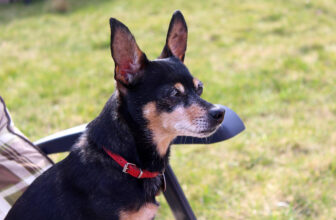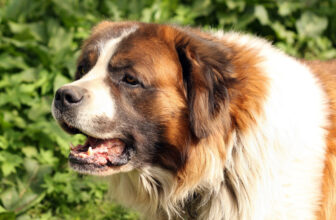
Check out our latest products
Shutterstock
Dogs are incredibly good at hiding pain, often staying quiet until their discomfort becomes serious. They rely on small shifts in behavior to communicate something’s off maybe it’s how they lie down, hesitate before jumping, or quietly move away from touch. Even the gentlest blink or subtle limp can speak volumes if we’re paying attention. When a normally active pup suddenly seems withdrawn or hesitant, it’s their way of asking for help. Catching these early signs can make all the difference in keeping our fur babies safe, healthy, and loved.
Reluctant to Jump

Shutterstock
When a dog used to leap into the car or onto sofas starts hesitating or refusing altogether, it’s a whispered sign of pain. Joints or muscles might be stiff, making once-fun jumps feel tough. They might lower their head or paw at the edge, trying to test the depth before committing. Their delay isn’t stubbornness, it’s caution masked in silence. Gentle encouragement and a vet check can clarify if it’s age-related stiffness or something treatable.
Slight Limp or Shift in Gait

Shutterstock
A barely noticeable limp or subtle favoring of one leg can be easy to miss. That tiny shift in stride may be a quiet plea from a sore hip, paw, or joint. Over time, compensating leads to muscle strain elsewhere, worsening the problem. Watch how they move when standing up, trotting, or turning around. With early attention, they can avoid chronic discomfort and regain normal stride.
Sniffing or Licking One Spot

Shutterstock
Dogs often lick or sniff a specific area when discomfort surfaces beneath their fur. That repeated attention speaks volumes; they’re trying to soothe or check an area that doesn’t feel right. This behavior might indicate skin irritation, joint aches, or internal discomfort. If you find a repeated focus on one spot, it’s worth digging deeper for signs like swelling, redness, or sensitivity. A quiet lickfest can be a serious nudge to help them heal.
Head Pressing Against Walls or Furniture

Shutterstock
Pressing their head against hard surfaces may seem odd, but dogs do this when they’re in pain or feeling disoriented. It can indicate discomfort in their head or spine, signaling a neurological issue or a deep headache. Because it’s not a behavior we naturally expect, many owners miss it until it repeats often. Keeping an eye out for head pressing can allow early intervention. If you notice it, seek veterinary guidance. Early diagnosis often leads to more effective relief.
Grinding Teeth in Their Sleep

Shutterstock
A quiet dog who grinds teeth during sleep may be masking mouth pain or dental issues. Unlike adult chomping, this soft, repetitive motion points to discomfort beneath the gums. Sleep grinding can also be a stress reaction to pain elsewhere in the body. Noticing this hidden habit early can prompt a dental exam that may prevent bigger health issues. It’s a little sound that speaks loudly about your dog’s comfort.
Subtle Change in Appetite

Shutterstock
A slight dip in appetite or slower eating pace might seem minor, but can reveal tummy troubles, dental pain, or even systemic disease. They eat less or hold treats longer in their mouths, like they’re savoring or avoiding discomfort. You may not notice at first, but tracking their mealtimes reveals a shift. Addressing it quickly often resolves the issue before it escalates.
Increased Yawning or Panting

Shutterstock
Dogs don’t always pant because they’re hot; excessive yawning or panting can signal pain, stress, or nausea. If they yawn in cool, calm moments or pant after minimal activity, pay attention. This silent distress call can hint at internal issues like abdominal pain or anxiety. A sudden rise in yawns or breaths is worth monitoring; it may be your dog’s hidden plea for relief.
Avoiding Play or Walks

Shutterstock
Losing interest in a favorite game or skipping a stroll is more than moodiness. If a playful pup becomes “meh” about fetch or sidesteps sidewalk adventures, discomfort might be the culprit. They may stiffen mid-walk or return early and seem quieter than usual. That shift from eagerness to hesitation often means the fun hurts. Adjusting activities and consulting a vet helps bring back their joy.
Trembling or Shaking

Shutterstock
A gentle tremor not tied to cold or excitement can be a symptom of pain or discomfort. Whether it shows up during rest, after exercise, or at a specific movement, notice it. Shivering can come from nervous strain or internal pain, not just cold. These tremors deserve a vet’s look to find out if it’s nerve-driven, muscular, or otherwise treatable.
Excessive Stretching

Shutterstock
Dogs communicate tension with stretching yoga-style, but when it’s excessive, they’re trying to loosen stiff joints. Overdoing the downward dog or doing it awkwardly suggests discomfort. It may be a warning of hip or spine issues, especially in older dogs. Noticing repeated stretching helps you catch pain patterns early and alleviate symptoms with the right support.
Irritability or Low Tolerance

Shutterstock
A dog snapping or stiffening when you touch familiar parts indicates discomfort. They may turn away during belly rubs or flinch at gentle pressure. This change isn’t them being rude, it’s setting pain boundaries. Sensitivity to petting, picking them up, or brushing hair hints that comfort zones have contracted. Gentle observation combined with a vet visit can pinpoint the pain source.
Restlessness at Night

Shutterstock
If a once-sound sleeper begins pacing or waking frequently, aches may be keeping them from rest. Aging joints, digestive issues, or neurological discomfort can throw sleep off balance. Notice when they reposition often or seem unsettled, quiet restlessness is a common signal of hidden pain. Creating an extra-soft bed and checking with a vet can restore comfortable shuteye.
Subdued Tail Wag

Shutterstock
A low or slow tail wag that doesn’t match your mood might be more than subdued excitement; it can speak of deeper discomfort. A dog in pain often tucks its tail or keeps it still, avoiding movement that jars inflamed areas. Even gentle wagging may be labored or cautious, not joyful. Sleeping states or slow waves can reveal pain where words don’t reach.
The Silent Whineers Society

Shutterstock
These quiet clues, such as slower eating, subtle limps, and less tail wagging, are your dog’s way of whispering for help. They aren’t being dramatic; they’re simply expressing discomfort in the calmest way they know. By noticing these small changes early, we can ease their pain and protect their joy. Our gentle awareness turns worry into action and discomfort into healing. Sometimes, love sounds like silence and looks like a softer walk or extra cuddle. When we listen closely, we give them the comfort they can’t ask for out loud.







![[5G & 2.4G] 2K Indoor Security Camera for Home Security, AI Voice Change for 2-Way Talk, Motion Detection, Night Vision, 24/7 SD Recording/Cloud Storage, WiFi Home Camera, Pet Cam with Phone App](https://i3.wp.com/m.media-amazon.com/images/I/61I2U+sTT3L._AC_SL1500_.jpg?w=300&resize=300,300&ssl=1)






